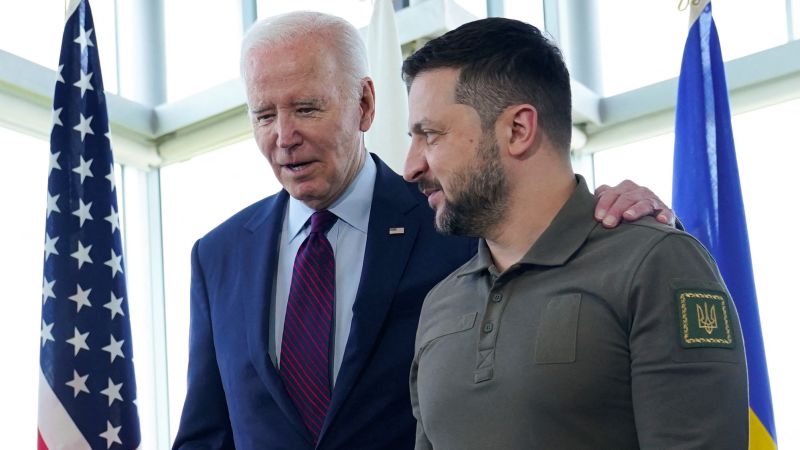A version of this story appears in CNN’s What Matters newsletter. To get it in your inbox, sign up for free here.
President Joe Biden’s support for Ukraine has evolved in key ways to give Ukraine ever more deadly firepower for its defense, but he remains opposed to fast-tracking what some allies say is the ultimate protection: inviting Ukraine into NATO.
That singular position, meant to avoid dragging the US into war with Russia, has remained even as others have slowly fallen.
Fighter jets. After opposing NATO members supplying Ukraine with F-16s, the US recently relented to international pressure from Europe, although it still will not supply Ukraine with its own.
Patriot missiles and modern tanks. The US changed course to provide access to the Patriot missile defense systems and modern Abrams tanks, speeding up the deployment process earlier this year.
Longer-range missile systems. After first refusing to supply longer-range missile systems, the US has pledged to provide ground-launched small diameter bombs, known as GLSDBs, that could give Ukraine’s military the range to strike within Russia. The US could go even further if it decides to give Ukraine access to different, longer-range missile systems known as ATACMS, as other NATO allies like the United Kingdom have done with their Storm Shadow missile system.
Cluster munitions. Now Biden has made the “difficult decision” to give Ukraine cluster munitions. It’s controversial since multiple other NATO members have promised never to use the devices and the decision drew condemnation from human rights groups.
But on another important front, Biden has not yet evolved. He’s not ready to invite Ukraine into NATO as soon as possible.
Some other, smaller NATO members have responded to the public relations campaign by Ukrainian President Volodymyr Zelensky that Ukraine should get that ultimate protection.
RELATED: What is NATO and when does it act?
The first NATO priority, Biden told CNN’s Fareed Zakaria in an interview that aired Sunday, is keeping the current configuration of NATO countries together and united.
“I don’t think there is unanimity in NATO about whether or not to bring Ukraine into the NATO family now, at this moment, in the middle of a war,” he said.
Referring to Article 5 of NATO’s charter, by which all countries pledge to defend all members, Biden said, “If the war is going on, then we’re all in a war. You know, we’re in a war with Russia if that were the case.”
RELATED: NATO’s Article 5, explained
But he did suggest it would be possible to “lay out a path, for the rational path, for Russia, for – excuse me, for Ukraine to be able to qualify to get into NATO.”
A specific pathway is well short of an invitation, but it would not be nothing. Zelensky has been working hard to build support for something more concrete. After a meeting with Zelensky last week, Czech Republic Prime Minister Petr Fiala said he would lobby at this week’s NATO summit in Vilnius, Lithuania, to get Ukraine an invitation to join the alliance.
Zakaria appeared on CNN on Monday to talk about his Biden interview with CNN’s Sara Sidner. First, he explained why all talk of Ukraine joining NATO is contingent on Ukraine’s war with Russia ending. Otherwise, the US would essentially be at war with Russia.
“We would have created that situation that everybody has been trying to avoid for 75 years, and that is a war between two nuclear arms powers.”
Zakaria also explained why it is a far different thing for a European country to back Ukraine NATO membership than it is for the US to take that step, since the US is footing most of the bill for NATO’s assistance to Ukraine.
“It’s very easy for a lot of small European countries to want to offer membership to Ukraine,” he said. “They’re not the ones who are going to be protecting Ukraine in the event of another Russian attack.”
There is a domestic rift in the US over Ukraine support too.
Sen. Lindsey Graham, the South Carolina Republican, said on Twitter that he will gather support to pressure Biden to more forcefully back adding Ukraine to NATO.
“Ukrainian NATO membership is vital to the future security of Europe and the world,” Graham said.
That point of view is at odds with some Republicans who have a more friendly view toward Russia. Businessman and presidential candidate Vivek Ramaswamy, for example, said Biden should oppose Ukraine ever joining NATO because it would march the world toward nuclear war.
Former President Donald Trump has said he would end Russia’s war on Ukraine within 24 hours of taking office in 2025 if he wins the election, although he has not said how.
Responding to that boast during an interview with ABC’s Martha Raddatz, Zelensky pointed out Russia held parts of Ukraine in Crimea during the entirety of Trump’s presidency.
“If we are talking about ending the war at the cost of Ukraine, in other words to make us give up our territories, well, I think, in this way, Biden could have brought it to an end even in five minutes, but we would not agree,” Zelensky told Raddatz through an interpreter.
Biden is seeing foreign policy through a much broader lens – and he said his vision of uniting democracies is a main selling point for his presidency.
When Zakaria asked about Democrats’ concerns with voting for an 80-year-old to serve another four-year term as president, Biden said this:
“I think we’re on the cusp of being able to make significant positive changes in the world. Really honest to God do,” he said, later adding, “I think we’re putting the world together in a way that is going to make things significantly – how can I say it – more secure for people.”
On NATO, Biden argued to Zakaria it’s important to retain “an open-door policy. We’re not going to shut anybody out.”
Meantime, he said the US will support Ukraine in the same way it supports Israel, “providing the weaponry and the needs, capacity to defend themselves if there is an agreement, if there is a cease-fire, if there is a peace agreement.”
Meantime, he said Ukraine needs to meet certain requirements to be eligible for membership, meeting thresholds on its democracy, for instance.
Adding new members requires unanimity among the NATO members, and unanimity can be hard to come by.
Turkey, for, instance had dragged out the addition of Sweden to NATO for a number of reasons. But on Monday, NATO chief Jens Stoltenberg said Turkey has agreed to back Sweden’s bid to join the alliance – representing a major win for Biden.
And despite Turkish President Recep Tayyip Erdoğan’s role as a sort of powerbroker between the West and Russia, he backed the idea of adding Ukraine to NATO after his own meeting with Zelensky last week.
Read the full article here





